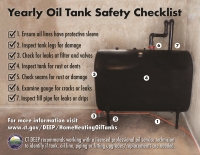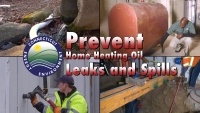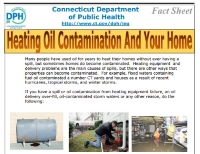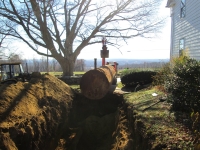Residential Home Heating Oil Tanks
Homeowners | Contractors
Information for Homeowners:
-
In 2018, 45% of Connecticut households used fuel oil or other petroleum products as the primary energy source for home heating.
-
Residential home heating oil tanks can be found:
-
in a home’s basement,
-
outside, above ground near the house or
-
buried in close proximity to the house.
-
-
Homeowners should be proactive, educate themselves on home heating oil tank safety, and work with their licensed service provider to prevent oil leaks and spills.

Home Heating Oil Tank Maintenance
Video: Prevent Home Heating Oil Leaks and Spills
 Video to educate homeowners, landlords and local officials on the hazards of having an unprotected oil line installed underground or within concrete basement floors.
Video to educate homeowners, landlords and local officials on the hazards of having an unprotected oil line installed underground or within concrete basement floors. Guidance for Residential Underground Home Heating Oil Tank Leaks

Heating Oil Contamination and Your Home
This fact sheet from the Connecticut Department of Health (DPH) provides an overview of how to detect, control and report oil spills within your home.Fuel for Thought
The Connecticut Council on Environmental Quality’s December 2019 report on the extent of accidental releases (spills and leaks) of home heating oil in Connecticut and recommendations to reduce the incidence and severity of accidental releases.
Appendix A of the report includes financing assistance programs in that are available for homeowners wishing to upgrade or replace their heating fuel systems and oil tanks.
Complaints
Have a complaint? Please submit your complaint using the Emergency Response and Spill Prevention Division's Complaint Intake System. If your complaint is an environmental emergency, call DEEP's Emergency Response Unit 24 hours a day at 866-DEP-SPIL (866-337-7745) or 860-424-3338.
Frequently Asked Questions about Residential Home Heating Oil Tanks
Answers to your questions about underground storage tanks and additional resources that you may find helpful.
Insurance Information
You may have homeowner’s insurance coverage for an escaped fuel loss. However, insurance coverage depends on the specific facts and circumstances of your loss and the terms, conditions and exclusions in your homeowner’s insurance policy. Not all homeowner insurance companies provide coverage for escaped fuel losses. If you have experienced a fuel loss, fuel spill and any damages, you should discuss the coverage under your policy with your insurance agent or the insurer directly. If the release is the fault of a heating oil dealer, homeowners should consult with their dealer. The State requires heating oil dealers to have general liability insurance coverage and insurance to cover any potential environmental damage due to heating oil spills. When a release of any petroleum or chemical occurs to the ground, this means that a release has occurred to the waters of the state. Water is a public trust. Thus discharges to soil or water result in third party damage because the waters of the state have been damaged by the release to the ground. The property owner or the entity that caused any condition which reasonably can be expected to create a source of pollution to the waters of the state is responsible for cleaning up the release and restoring the soil and water.
Department of Insurance Contact Information
- Online portal: to file a complaint or ask a question Website: https://portal.ct.gov/cid.
- On the home page, look for “Complaints and Questions".
- Call the Consumer Services Division at: 1 (800) 203-3447 or (860) 297-3900.
- E-mail the Department of Insurance at: insurance@ct.gov.
Emergency Response and Spill Prevention
Information to help guide contractors who are installing, maintaining and/or servicing underground storage tanks that serve five or more residential units.

Guidance for Contractors that Remove Residential Tanks
Pursuant to CGS Sec. 20-420, in order to remove or replace Residential Underground Heating Oil Storage Tank Systems, certain training, approved by DEEP, must be completed. Details for contractors can be found on the Connecticut Department of Consumer Protection’s (DCP) web page at: https://portal.ct.gov/dcp/Trade-Practices-Division/Removal-Requirements-for-Underground-Storage-Tanks.
Such approved training includes both of the following courses:
- Occupational Safety & Heath Administration’s (OSHA’s) 40-Hour Hazardous Waste Operations Emergency Response (HAZWOPER) Training per 29 CFR 1910.120, and subsequent annual 8-hr refresher training; and
- International Codes Council’s (ICC’s) UST Tank Decommissioning U2 Training.
Emergency Response and Spill Prevention
Emergency Response and Spill Prevention Contacts
Educational Resources for Contractors that Work with Homeowners:

Video: Prevent Home Heating Oil Leaks and Spills
Educates homeowners, landlords and local officials on the hazards of having an unprotected oil line installed underground or within concrete basement floors.
Heating Oil Contamination and Your Home
This fact sheet from the Connecticut Department of Health (DPH) provides an overview of how to detect, control and report oil spills within your home.
Content last updated January 2025

